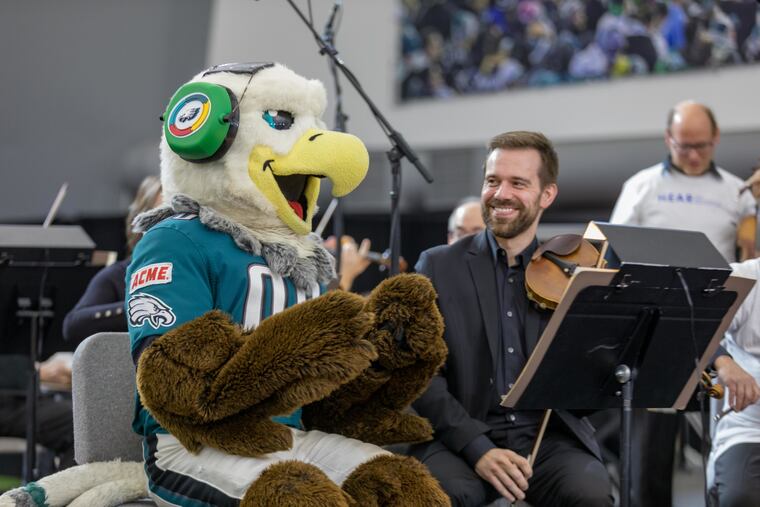Philadelphia Orchestra touches down in Eagles territory for ‘sensory friendly’ concert
Sunday's concert was geared toward a special needs audience. New assistant conductor Erina Yashima was on the podium. Jason Kelce was in the crowd.

Beneath a yellow goalpost and with a green of artificial turf laid before them, the Philadelphia Orchestra on Sunday afternoon reached beyond the ensemble’s usual comfort zone.
This concert, at the Eagles’ South Philadelphia practice facility, was more about the audience’s comfort level. It would be a “shush-free” environment, orchestra president Matías Tarnopolsky told an audience of special needs children and adults, caregivers and others.
Among the crowd of 1,500 or so at the NovaCare Complex: Eagles center Jason Kelce, his wife, Kylie, and infant daughter Wyatt.
Silence is golden in the audience at most orchestra concerts. But the point here was that listeners could feel confident that they wouldn’t draw the usual judgy stares for verbalizations, moving around or being seized by a dance vibe too strong to resist.
Dance they did. A pair of wiry girls in the audience wiggled rapturously and air-conducted to the orchestra’s “Superman March” from John Williams’ score for Superman. Others clapped, hummed along, or appeared lulled into worlds interior or distant.
A long time ago in a galaxy far, far away is where conductor Erina Yashima directed the audience’s imagination in comments leading into a movement from Holst’s The Planets. Not that far away, it turned out, since listeners looked immediately rapt during “Mars, the Bringer of War," part of this very galaxy.
“Let’s see if we can score a touchdown for you,” she told the crowd before leading the orchestra in the overture to Mozart’s The Marriage of Figaro, a piece she described as having all the spirit of a wide receiver.
The comparison was apt. The one-hour concert was, after all, the combined effort of the Eagles, Eagles Autism Foundation, the orchestra, and Drexel and Temple Universities. Art-Reach provided staff training and helped build connections to the disability community.
The concert was about Yashima, too, still new as the orchestra’s assistant conductor. German-born and -trained, she led the orchestra’s brass and organ at Christmastime, and has conducted the orchestra in school concerts. This, though, was her first public outing with the full orchestra, and she brought a crisp and energetic presence to the last movement of Tchaikovsky’s Symphony No. 4.
The format of the concert didn’t give her the biggest expressive canvas, but she did give strong hints of personality, pacing the Tchaikovsky’s last few bars for maximum dramatic impact. Yashima is also a charming speaker, which never hurts in a conductor.
The orchestra has been doing sensory-friendly concerts for a few years now, hopping on a trend popular across the entire arts sector. One worries about trends. The last thing a traditionally underserved population needs is the dangling of opportunities that turn out to be short-lived.
Key to continuing such initiatives is knowing whether they are succeeding. And so, how does one gauge success?
Metrics are king these days — how many people are being served, in which geographic areas, and the like. But how meaningful the experience is should not be neglected. Music is inevitably personal, no matter who is listening, and you never know how deeply it is being felt.
On the Broad Street bus back into the city, one man who had been at the concert rocked back and forth in his seat, hunched over and talking to himself. I asked how he liked the music. “Good,” he said before getting off at Snyder Avenue to catch another bus.
My brother, severely epileptic and moderately autistic, sat through the concert giving few outward clues. He was also monosyllabic afterward. But he has talked about specific aspects of concerts he has attended years after the fact.
It’s hard to put metrics to these kinds of responses, especially given the current mind-set of believing we can know everything that’s going on by aggregating and analyzing data in real time.
Sometimes, though, you just know you’re doing good in the world, and this Philadelphia Orchestra concert was one of those times.
The Philadelphia Orchestra’s family concerts are all sensory-friendly. The next one is Saturday, March 7, at 11:30 a.m. at Verizon Hall, Broad and Spruce Streets. The program includes Saint-Saëns’ Carnival of the Animals. Tickets are $20-$49 (215-893-1999, philorch.org).